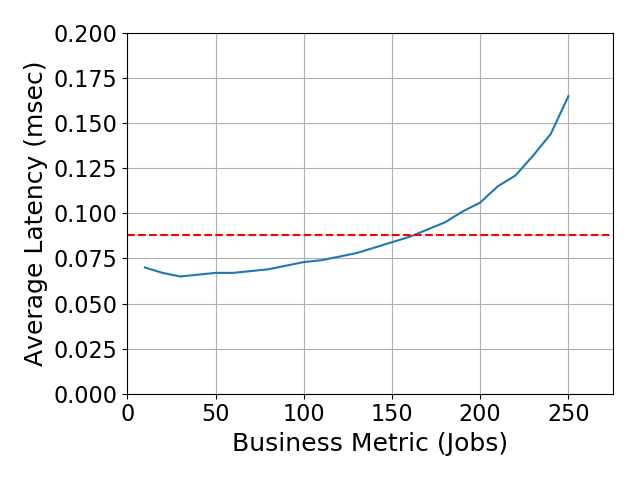
SPECstorage™ Solution 2020_genomics Result
Copyright © 2016-2024 Standard Performance Evaluation Corporation
 |
SPECstorage™ Solution 2020_genomics ResultCopyright © 2016-2024 Standard Performance Evaluation Corporation |
| DELL Technologies | SPECstorage Solution 2020_genomics = 250 Jobs |
|---|---|
| PowerEdge R6715 | Overall Response Time = 0.09 msec |
|

|
| PowerEdge R6715 | |
|---|---|
| Tested by | DELL Technologies | Hardware Available | 09/2024 | Software Available | 09/2024 | Date Tested | 09/2024 | License Number | 6573 | Licensee Locations | Round Rock, TX |
This Dell PowerEdge R6715 1U Rackmount Server for DataCenter is powered by a AMD EPYC 5th generation 9355P processor. A single 9355P processor provides 32 cpu cores. When SMT is enabled via BIOS, it provides 64 cpu threads. This system is configured with 1.5TB mem and 16 2.5" local NVMe drives for the benchmark run.
| Item No | Qty | Type | Vendor | Model/Name | Description |
|---|---|---|---|---|---|
| 1 | 1 | 1U Rackserver | DELL Technologies | PowerEdge R6715 | This is a Dell Technologies 1U Rackmount server powered by a AMD EPYC 5th generation 9355P processor. The system supports 24 DIMMs with max mem speed of 5200 MT/s (in 1DPC mode). It supports 2 M.2 drives and up to 16 E3.s drives The system has 2x USB3 ports. |
| Item No | Component | Type | Name and Version | Description |
|---|---|---|---|---|
| 1 | SUT | Linux | Ubuntu 24.04.1 | Operating system for load generation and benchmark execution. |
| Component Name | Parameter Name | Value | Description |
|---|---|---|
| N/A | N/A | N/A |
BIOS Settings: Simultaneous Multi Threading(SMT) was enabled to provide 64 cpu threads support.
| Component Name | Parameter Name | Value | Description |
|---|---|---|
| vm.swappiness | 10 | Reduce the VM swappiness |
Pass-thru IOMMU was enabled in the OS boot parameter. Added the following line into /etc/default/grub file. GRUB_CMDLINE_LINUX_DEFAULT="iommu=pt".
None
| Item No | Description | Data Protection | Stable Storage | Qty |
|---|---|---|---|---|
| 1 | SSD Dell NVMe PM1743 RI E3.S 3.84TB, Gen5 Disks | RAID0 | Stable Storage | 15 |
| 2 | SSD NVMe OS Disk | EXT4 | Stable Storage | 1 |
| Number of Filesystems | 2 | Total Capacity | 60T | Filesystem Type | EXT4 |
|---|
Software RAID0 was created by running mdadm command on the local 15 NVMe disks. mkfs.ext4 command was used for creating EXT4 file system for this benchmark run.
The ext4 filesystem was mounted with defaults,noatime options.
| Item No | Transport Type | Number of Ports Used | Notes |
|---|---|---|---|
| 1 | N/A | N/A | N/A |
None
| Item No | Switch Name | Switch Type | Total Port Count | Used Port Count | Notes |
|---|---|---|---|---|---|
| 1 | N/A | N/A | N/A | N/A | N/A |
| Item No | Qty | Type | Location | Description | Processing Function |
|---|---|---|---|---|---|
| 1 | 1 | CPU | SUT | AMD EPYC Gen5 9355P | RAID0, Storage functions |
N/A
| Description | Size in GiB | Number of Instances | Nonvolatile | Total GiB |
|---|---|---|---|---|
| 2Rx8 PC5-6400B-R | 128 | 12 | V | 1536 | Grand Total Memory Gibibytes | 1536 |
System has 24 DIMM slots and only 12 DIMM slots were used for the benchmark run.
The EXT4 file system provides journaling support for filesystem protection.
The benchmark was ran on a single PowerEdge R6715 server with local NVMe storage disks. RAID0 config was created using the drives and EXT4 file system was setup on the RAID0. Ubuntu 24.04.1 OS was installed on an internal NVMe drive. There were no additional external clients or storage devices or network devices were connected to this setup. The new PowerEdge R6715 system has a AMD EPYC 9355P (32cores) processor and 16 NVMe drives were connected to support lots of disk storage and good storage performance. The testing was done with SMT enabled in BIOS, providing 64 cpu threads for more processing power.
None
This single server setup has a RAID0 partition created on the local storage drives and EXT4 file system was created on the RAID. Data gets written directly on to the EXT4 filesystem and on to the NVMe storage devices. No other external storage device was used.
The benchmark was ran on a single DELL Technologies PowerEdge R6715 server using its local NVMe drives. This benchmark was tested on Ubuntu 24.04.1 OS with kernel 6.8.0-45-generic. No other client system, or external storage device or networking device was connected to this test system. None of the components used to perform the test were patched with Spectre or Meltdown patches (CVE-2017-5754, CVE-2017-5753, CVE-2017-5715). Vulnerabilities: Gather data sampling: Not affected Itlb multihit: Not affected L1tf: Not affected Mds: Not affected Meltdown: Not affected Mmio stale data: Not affected Reg file data sampling: Not affected Retbleed: Not affected Spec rstack overflow: Not affected Spec store bypass: Mitigation; Speculative Store Bypass disabled via prctl Spectre v1: Mitigation; usercopy/swapgs barriers and __user pointer sanitization Spectre v2: Mitigation; Enhanced / Automatic IBRS; IBPB conditional; STIBP always-on; RSB filling; PBRSB-eIBRS Not affected; BHI Not affected Srbds: Not affected Tsx async abort: Not affected
DELL is a registered trademark of DELL Technologies, 1 Dell Way, Round Rock, Texas 78682. AMD is a registered trademark of Advanced Micro Devices, Inc, Santa Clara, CA 95054. EPYC is a registered trademark of Advanced Micro Devices, Inc, Santa Clara, CA 95054.
Generated on Tue Sep 24 20:25:11 2024 by SpecReport
Copyright © 2016-2024 Standard Performance Evaluation Corporation